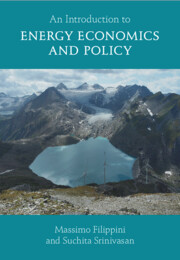Book contents
- Frontmatter
- Contents
- Figures
- Tables
- Preface
- Acknowledgements
- 1 Energy Economics and Current Energy Systems
- 2 Market Failures and Behavioural Anomalies
- 3 Energy Demand–Theory and Empirical Analysis
- 4 Economic Analysis of Energy Investments
- 5 Economics of Energy Efficiency
- 6 Energy-related Market Forms
- 7 Market-based Economic Instruments
- 8 Non-market-based Instruments
- 9 Policy Choice and Evaluation
- Special Terms
- References
- Index
5 - Economics of Energy Efficiency
Published online by Cambridge University Press: 19 December 2024
- Frontmatter
- Contents
- Figures
- Tables
- Preface
- Acknowledgements
- 1 Energy Economics and Current Energy Systems
- 2 Market Failures and Behavioural Anomalies
- 3 Energy Demand–Theory and Empirical Analysis
- 4 Economic Analysis of Energy Investments
- 5 Economics of Energy Efficiency
- 6 Energy-related Market Forms
- 7 Market-based Economic Instruments
- 8 Non-market-based Instruments
- 9 Policy Choice and Evaluation
- Special Terms
- References
- Index
Summary
In this chapter, we discuss some important elements of the economics of energy efficiency. We start by illustrating the definition of energy efficiency from a microeconomic point of view and then describe the most important empirical methods to measure the energy efficiency of an economy, a region, a firm, or a household. Afterwards, we present how households can evaluate investments in energy efficiency. To this end, we introduce the concept of lifetime costs. A central discussion of this chapter is developed on the concept of energy efficiency gap, that is a situation in which economic agents don’t invest in the most energy-efficient solutions, although they may be the most beneficial. We then explain the barriers that give rise to the energy efficiency gap, paying special attention to behavioural anomalies, in particular bounded rationality and the role of energy-related financial literacy. At the end of the chapter, we also present the rebound effect and discuss issues in developing countries related to the topics discussed in the chapter.
Keywords
- Type
- Chapter
- Information
- An Introduction to Energy Economics and Policy , pp. 102 - 126Publisher: Cambridge University PressPrint publication year: 2024
- Creative Commons
- This content is Open Access and distributed under the terms of the Creative Commons Attribution licence CC-BY-NC-ND 4.0 https://creativecommons.org/cclicenses/

